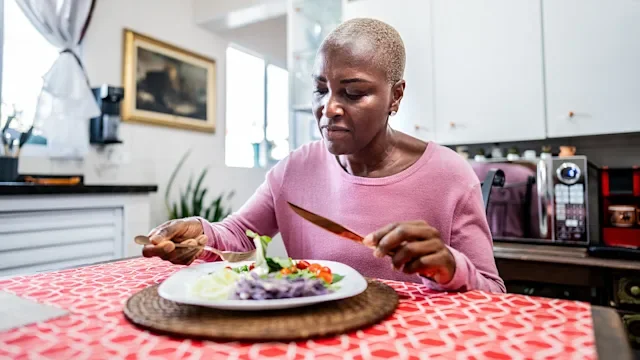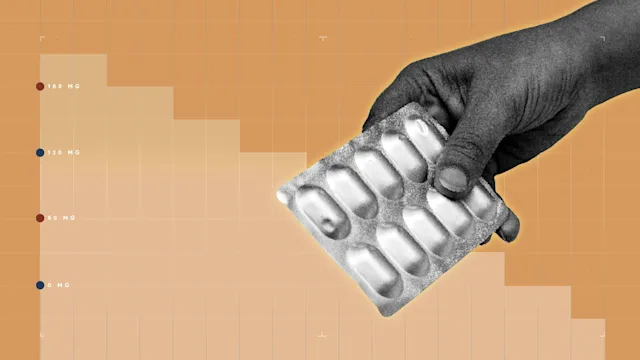Key takeaways:
The best anti-aging skin care routines combine healthy skin care habits with the right products.
If you’re in or around your 40s, use retinol cream to help reduce fine lines and wrinkles and increase skin firmness (elasticity).
Hydrating your skin with products like hyaluronic acid or glycerin also helps improve dry skin caused by changing hormones during menopause.
Everyday habits that also improve your skin health include daily cleansing, SPF, sleep, and a healthy diet. Taking steps to reduce stress, alcohol, and smoking will also help.
Many people are curious about the best anti-aging skin care tips. For many, this curiosity about how to keep skin looking healthy and youthful deepens in their 40s and the years around menopause. Fortunately, an effective anti-aging skin routine doesn’t have to be complicated.
Dr. Abigail Waldman, a dermatologist and the director of Mohs and Dermatologic Surgery Center at Brigham and Women’s Hospital, weighs in with the top eight tips to reduce fine lines, retain firm skin, and delay signs of aging.
1. Keep your skin clean and hydrated
To start, Dr. Abigail recommends washing your face twice a day with a gentle cleanser. If you wear sunscreen or makeup, consider using a micellar water or oil-based cleanser. Use warm water, your fingertips, and a mild cleanser. And avoid harsh scrubs or brushes.
Then use a moisturizer to hydrate your skin and help keep its barrier function working well. Dr. Waldman recommends using moisturizers with niacinamide, hyaluronic acid, or ceramides.
The specific products you use also depends on your skin type. Keep in mind that your skin type can change over time, and the products you use may change as well.
Cleansers and moisturizers can be creams, gels, or a foaming combination of the two. You can find these labels on the product box or container. Gels have more water, so they’re lighter. Creams have more oil, so they’re thicker. Here’s what to look for based on your specific skin type.
Skin type | Cleanser type | Moisturizer type |
|---|---|---|
Dry | Cream based | Cream based |
Oily | Gel based | Lightweight lotion or gel based |
Combination | Foaming | Lightweight or gel based on oily areas; lotion on dry areas |
2. Protect your skin from the sun every day
Protecting your skin from the sun is key, no matter your age, says Dr. Waldman. Many of the skin changes that you see as you get older are from sun damage.
Photoaging is what happens when the skin is not protected from ultraviolet (UV) light. Over time, this damage adds up to cause fine lines, wrinkles, and uneven pigmentation.
Here’s how you can protect your skin from the sun and prevent photoaging:
Use a broad-spectrum sunscreen of at least SPF 30 every day.
Stay in the shade, especially midday.
Wear wide-brimmed hats and sun-protective clothing.
- Vivelle-DotDotti and Estradiol
- ClimaraEstradiol
- DivigelEstradiol
3. Get plenty of sleep
There’s a reason people call it “beauty sleep.” Regularly getting a good night’s sleep is key to keeping your skin healthy and youthful. A lack of sleep has been linked to signs of premature aging, like fine lines, uneven pigmentation, and loss of skin firmness (elasticity).
Aim for 7 to 9 hours of sleep each night. If you’re having a hard time doing that, improving your sleep hygiene can help you regularly get a good night’s sleep.
4. Choose healthy foods
Having too much sugar in your diet can lead to health problems like diabetes. And it may also wreak havoc on your skin and lead to “sugar sag.” When blood sugar levels are constantly high, that extra sugar can change substances it touches (a process called glycation). This damages the collagen and elastin in your skin, which weakens the support structure and causes sagging and wrinkles.
To lower how much sugar you consume, avoid added sugars. And to nourish your skin from within, prioritize a diet rich in whole foods, protein, and vegetables.
5. Manage stress
Long-term stress has been linked to signs of premature aging, like fine lines and wrinkles. When you're stressed over long periods of time, your body’s stress hormones rise. Over time, these hormones break down the collagen and elastin in your skin and interfere with the skin's renewal process.
It’s impossible to totally avoid stress, but there are stress-reducing strategies that you can work into your daily routine. Breathing exercises and mindfulness are two accessible options.
6. Stop smoking
Smoking isn’t just bad for your lungs and overall health. It also has unhealthy effects on your skin and can lead to signs of premature aging.
Tobacco smoke can break down collagen and elastic fibers, leading to fine lines and wrinkles. Smoking also increases your risk of squamous cell carcinoma, a type of skin cancer.
Quitting smoking can be tough, but you don’t have to do it alone. Getting support can help you kick the habit for good.
7. Limit your alcohol intake
Too much alcohol can have a negative effect on your skin. Studies show that people who drink heavily (more than 8 drinks a week) have increased wrinkles and under-eye puffiness. Drinking too much can also cause blood vessels in the skin to get bigger, leading to a permanently red face.
If you choose to drink alcohol, stay within safe limits. This means a daily limit of 2 drinks for men and 1 drink for women.
8. Choose the right anti-aging products
The care your skin needs changes as you age. So it makes sense that the ideal anti-aging products change based on your age, too.
According to Dr. Waldman, you may start noticing signs of collagen loss in your 40s, including wrinkles, crepey skin, and sagging. “Brown spots, flushing or redness, and other skin discoloration can be an issue as well,” Dr. Waldman adds.
In addition to daily sunscreen use, here are the best anti-aging skin care products by age.
Best anti-aging skin care products for your 40s
Retinol and antioxidants are key anti-aging ingredients to add to your regular skin care routine. They’re available in different formulations, like creams and serums. And they’re in most pharmacies:
Retinol can help increase skin firmness and reduce fine lines and wrinkles. There’s an over-the-counter retinol and a prescription-strength retinoid. Dr. Waldman notes that retinol works as well as prescription retinoids, but they take longer to work.
Antioxidants, like vitamin C or niacinamide, can help boost collagen and reduce damage from the sun.
Best anti-aging skin care products for your 50s
Hormone changes during menopause can make your skin feel dry, thin, and dull. Hydration and skin rejuvenation become even more important during menopause and your 50s. Here are some ingredients that can help:
Hyaluronic acid or glycerin can help increase skin hydration.
Peptide cream can help increase skin’s collagen and repair the skin barrier.
Glycolic acid and lactic acid can gently exfoliate your skin. Dr. Waldman recommends doing this 1 to 3 times a week (just be sure to skip the retinol those nights to avoid irritation).
Skin care in your 60s and beyond
During your 60s and beyond, skin loses moisture even more easily. And it can feel especially dry and irritated. In addition to regularly moisturizing your skin, these tips can help prevent skin dryness and irritation:
Keep showers brief, and use warm (not hot) water.
Use a fragrance-free and moisturizing cleanser.
Apply moisturizer within 3 minutes of bathing. This helps lock in moisture.
The bottom line
Developing a simple, anti-aging skin care routine that you can remember will help keep your skin healthy and youthful. In your 40s, start by using retinol and antioxidant creams to combat the initial signs of aging, like fine lines and wrinkles. During menopause and your 50s, focus on hydration and exfoliation. For the most effective anti-aging skin care routine, follow these strategies along with healthy habits like regular sun protection, healthy eating, and stress management.

Why trust our experts?


References
American Academy of Dermatology Association. (n.d.). Caring for your skin in menopause.
American Academy of Dermatology. (n.d.). Chemical peels: Overview.
American Academy of Dermatology Association. (2022). Feeling stressed? It can show in your skin, hair, and nails.
American Cancer Society. (2019). Basal and squamous cell skin cancer risk factors.
Bissett, D. L., et al. (2005). Niacinamide: A B vitamin that improves aging facial skin appearance. Dermatologic Surgery.
Goodman, G. D., et al. (2019). Impact of smoking and alcohol use on facial aging in women: Results of a large multinational, multiracial, cross-sectional survey. The Journal of Clinical and Aesthetic Dermatology.
Ludmann, P. (2021). How to care for your skin in your 60s and 70s. American Academy of Dermatology Association.
Morita, A. (2007). Tobacco smoke causes premature skin aging. Journal of Dermatological Science.
Simpkin, S. (2011). Cutaneous adverse effects of alcohol. DermaNet.
Skin Cancer Foundation. (2019). Photoaging: What you need to know about the other kind of aging.
Skin Cancer Foundation. (2019). Sun-protective clothing.
University Hospitals Case Medical Center. (2013). Sleep deprivation linked to aging skin, study suggests.












